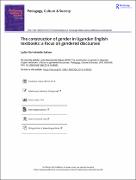| dc.description.abstract | Informed by a feminist post-structural framework, this study departs
from the overriding emphasis on explicit constructions of women
in textbooks. It focuses on culturally implicit knowledge and/or
gendered discourses that have informed the construction of gender
in Ugandan secondary school textbooks. Findings illuminate the
construction of women using discourses networked to produce
them as emotional, invested in physical appearances, vulnerable, and
in need of men. Intertwined within these are mutually supporting
discourses that construct them as irrational, passive, nurturing, trivial,
empty-headed, and jealous. Women were constructed oppositionally
to men, produced as rational, physically fit breadwinners. This
configuration of discourses draw on an underlying ‘common-sense’
gender-differences discourse, which secures female/male border
maintenance, sustaining unequal power relations. In exceeding the
dominant focus on visibility therefore, this study illuminates how
women are constructed, illuminating the workings of power through
discourse to re-inscribe hierarchical gender-power relations, tackling
deeper gender inequalities and hierarchies. | en_US |


